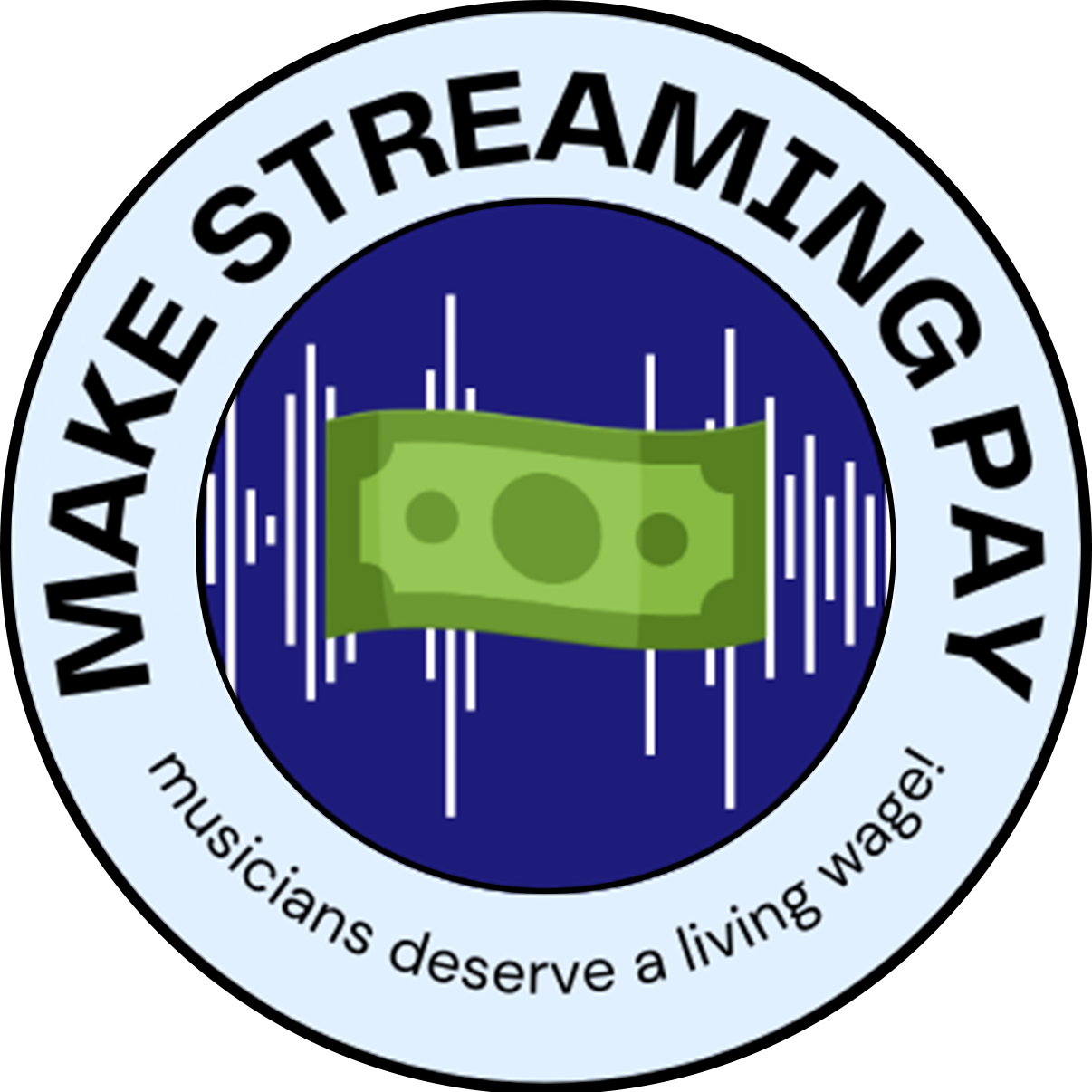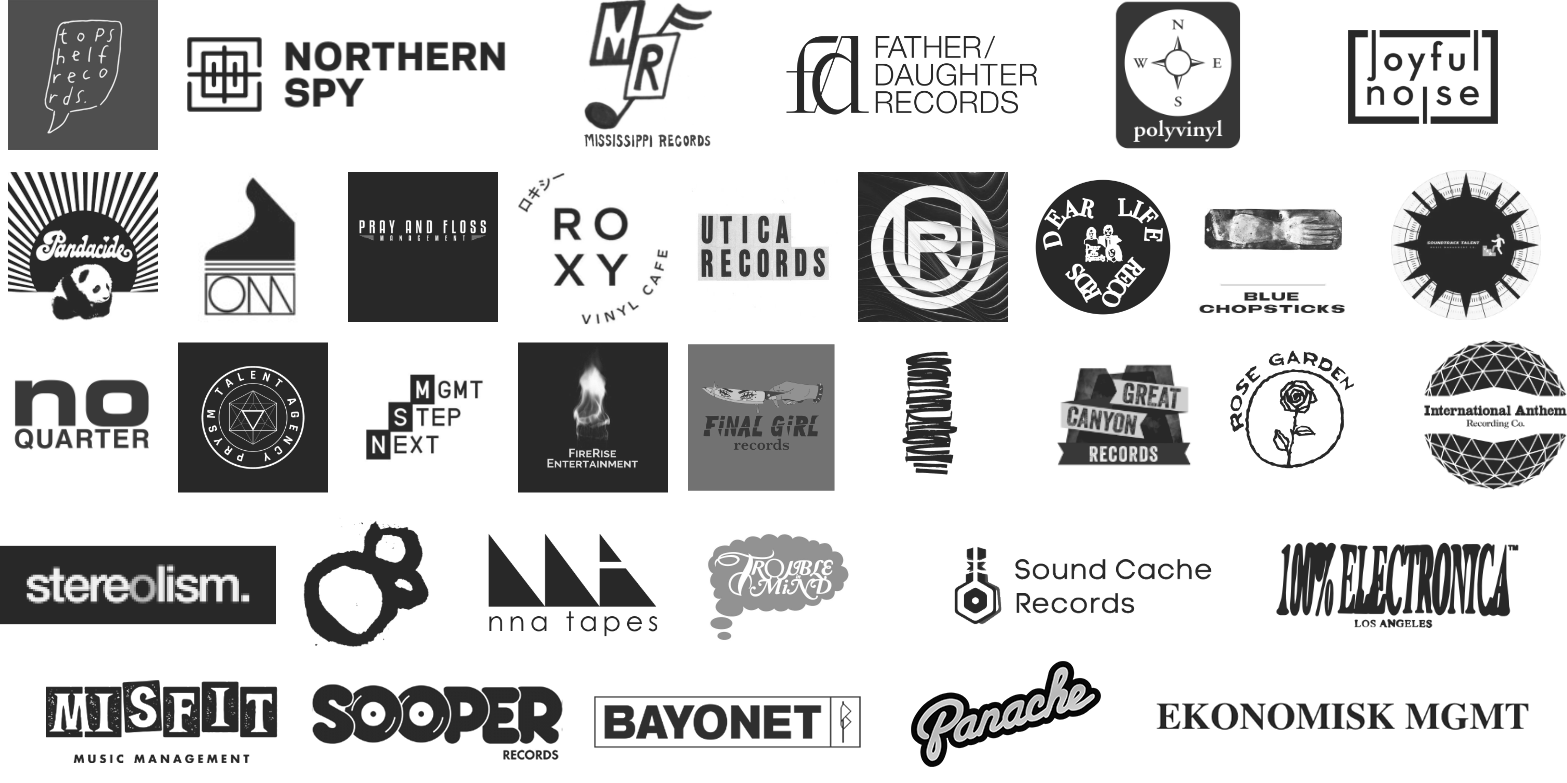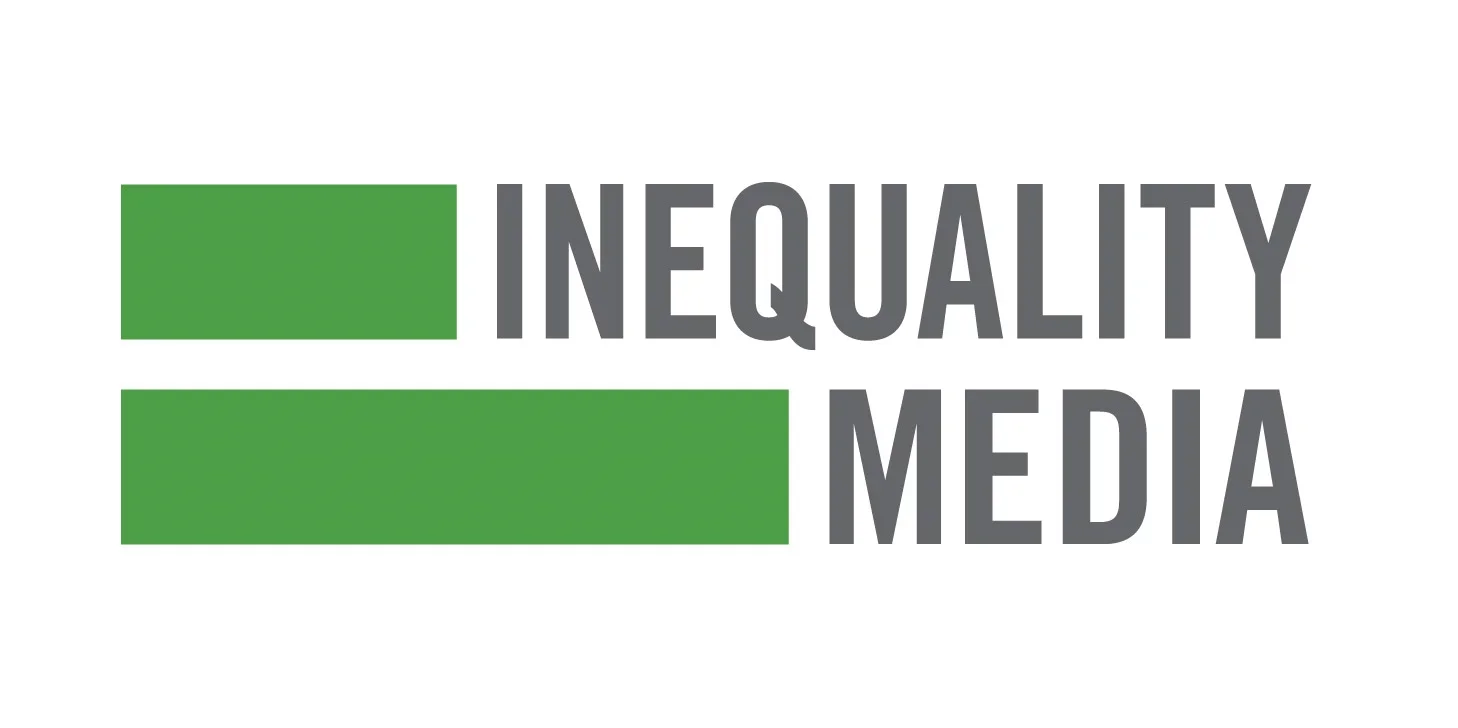The Living Wage for Musicians Act
Tell your lawmakers to co-sponsor and pass the Living Wage for Musicians Act!
On September 29, Representative Rashida Tlaib will reintroduce the Living Wage for Musicians Act — the bill to finally regulate streaming services like Spotify and ensure fair streaming payouts to artists. This legislation would create a new streaming royalty paid directly to artists, ensuring that musicians can build sustainable careers in the digital age. The new royalty would be an additional revenue stream on top of artists’ existing royalties.
Use our form here to send a letter to your lawmakers asking them to co-sponsor the bill. We need to flood D.C. with letters so that lawmakers know musicians are united in our demand for fair pay in streaming.
*By signing, you agree to have your artist or organization name publicly listed as a supporter of the Living Wage for Musicians Act
Enough is enough!
Music workers create the enormous wealth that streaming platforms accumulate for their CEOs and investors year after year. But artists continue to be underpaid, misled, and otherwise exploited by streaming platforms. While artists experience declining wages and increasingly precarious employment, the music industry as a whole has reaped unprecedented profits, and CEOs of tech companies have become billionaires.
The Living Wage for Musicians Act is built to pay artists a minimum penny per stream, an amount calculated specifically to provide a working class artist a living wage from streaming.
Share with other musicians and allies:
Amber Coffman - Algiers - Califone - Eli Winter - Belly - Big Thief - The Mynabirds - Destroy Boys - Richard Buckner - Kid Millions - Mary Lattimore - Vijay Iyer - Spoon - Larry Crane (Tape Op) - William Basinski - Deerhoof - Mountain Goats - Unwound - Guy Picciotto - Brad Mehldau - L’Rain - Bethany Cosentino / Best Coast - Panda Bear - Nate Ruess - Ted Leo - Sam Amidon - Dee Dee Bridgewater - Julia Holter - Tashi Wada - Andy Cabic - Will Stratton - Mourning [A] BLKstar - Sarah Davachi - Horse Lords - Ben Chasny - Horsegirl - Stephan Mathieu (mastering engineer) - Will Sheff - Meg Baird - Mutual Benefit - Joseph Allred - Jeremiah Chu - Juliana Barwick - Joey Burns - Tara Jane O’Neill - Stephen Gardner - Circuit des Yeux - Elisa Ambrogio - The Royal Arctic Institute - matana roberts - Jeff Rosenstock - Heba Kadry (mastering engineer) - Shigeto - Kathleen Hanna - Calvin Johnson - Damon & Naomi - Downtown Boys - Daniel Bachman - Rick Brown - Lori Goldston - Antibalas - Faten Kanaan - Huerco S. - Pissed Jeans - Zola Jesus - Austra - Machine Girl - cumgirl8 - Chris Coady (Producer) - Ken Vandermark - Cloud Nothings - Marian Hill - Mukqs - Chris Cohen - Gavilán Rayna Russom - Pallbearer - Sextile - SAMMUS / Enongo Lumumba-Kasongo - Little Moon - The Head and The Heart - Britt Daniel - The Hotelier - Starchild & The New Romantic - Cold Cave - Molly Burch - Pom Pom Squad - Chastity Belt - Deakin of Animal Collective - megan james - Purity Ring - Jeff Tobias - DIIV - stars - The Dandy Warhols - The Black Dahlia Murder - Brockhampton / merlyn wood - People Under The Stairs - Wild Nothing - ADULT. - Aaron Dilloway - HTRK - Mike Marra (Mastering Engineer) - Scary Kids Scaring Kids - She Wants Revenge - Holy Wave - Markus Floats - Tess Roby - Dylan Wall (Producer) - Mount Eerie - No Swoon - Katie Alice Greer - Joel Jerome - Little Wings - Mega Bog - iji - YACHT - Tara Jane O’Neil - Black Marble - Dear Nora - Nite Jewel - Sinkane - Rob Noyes - Rick Berlin - Art School Girlfriend - Tyler Meacham - The Cradle - Stolen Jars - Crispin Hunt - Alaska Reid – Mamalarky – Boyscott -
Amber Coffman - Algiers - Califone - Eli Winter - Belly - Big Thief - The Mynabirds - Destroy Boys - Richard Buckner - Kid Millions - Mary Lattimore - Vijay Iyer - Spoon - Larry Crane (Tape Op) - William Basinski - Deerhoof - Mountain Goats - Unwound - Guy Picciotto - Brad Mehldau - L’Rain - Bethany Cosentino / Best Coast - Panda Bear - Nate Ruess - Ted Leo - Sam Amidon - Dee Dee Bridgewater - Julia Holter - Tashi Wada - Andy Cabic - Will Stratton - Mourning [A] BLKstar - Sarah Davachi - Horse Lords - Ben Chasny - Horsegirl - Stephan Mathieu (mastering engineer) - Will Sheff - Meg Baird - Mutual Benefit - Joseph Allred - Jeremiah Chu - Juliana Barwick - Joey Burns - Tara Jane O’Neill - Stephen Gardner - Circuit des Yeux - Elisa Ambrogio - The Royal Arctic Institute - matana roberts - Jeff Rosenstock - Heba Kadry (mastering engineer) - Shigeto - Kathleen Hanna - Calvin Johnson - Damon & Naomi - Downtown Boys - Daniel Bachman - Rick Brown - Lori Goldston - Antibalas - Faten Kanaan - Huerco S. - Pissed Jeans - Zola Jesus - Austra - Machine Girl - cumgirl8 - Chris Coady (Producer) - Ken Vandermark - Cloud Nothings - Marian Hill - Mukqs - Chris Cohen - Gavilán Rayna Russom - Pallbearer - Sextile - SAMMUS / Enongo Lumumba-Kasongo - Little Moon - The Head and The Heart - Britt Daniel - The Hotelier - Starchild & The New Romantic - Cold Cave - Molly Burch - Pom Pom Squad - Chastity Belt - Deakin of Animal Collective - megan james - Purity Ring - Jeff Tobias - DIIV - stars - The Dandy Warhols - The Black Dahlia Murder - Brockhampton / merlyn wood - People Under The Stairs - Wild Nothing - ADULT. - Aaron Dilloway - HTRK - Mike Marra (Mastering Engineer) - Scary Kids Scaring Kids - She Wants Revenge - Holy Wave - Markus Floats - Tess Roby - Dylan Wall (Producer) - Mount Eerie - No Swoon - Katie Alice Greer - Joel Jerome - Little Wings - Mega Bog - iji - YACHT - Tara Jane O’Neil - Black Marble - Dear Nora - Nite Jewel - Sinkane - Rob Noyes - Rick Berlin - Art School Girlfriend - Tyler Meacham - The Cradle - Stolen Jars - Crispin Hunt - Alaska Reid – Mamalarky – Boyscott -
Artists Who support The Living Wage for Musicians Act
The Living Wage for Musicians Act would create a new royalty from streaming music that would bypass existing contracts, and go directly from platforms to artists.
The mechanism behind the Living Wage for Musicians Act is simple. The royalty would be funded through an additional subscription fee and a 10% levy on non-subscription revenue. This money would be paid into an Artist Compensation Royalty Fund, which will then be distributed directly to both featured and non-featured artists by a non-profit administrator. Congress set this precedent by unanimously passing laws in the 1990s that established a similar fund for money collected from manufacturers of recordable digital media, and a similar direct payment system to artists from Satellite Radio and Internet Broadcast platforms. As a result, the administrative system for collecting funds and distributing them directly to musicians already exists. The Living Wage for Musicians Act makes use of these same mechanisms for new digital audio technologies and applies them to streaming for the first time.
The Artist Compensation Royalty Fund will be distributed directly to recording musicians by a non-profit organization—just as SoundExchange does now for satellite radio and internet broadcast. Payouts from the fund are proportional to streams by track, same as they are calculated now—but with the crucial difference that this new money will go directly to artists, and not pass through labels.
Finally, the Living Wage for Musicians act includes a maximum payout per track, per month, in order to generate a more sustainable income for a broader and more diverse set of artists. Money exceeding this cap (as it stands, 1,000,000 streams for a track in a month) will be used to increase the payout per stream for all recording musicians. This will help us achieve our goals of helping musicians in every genre, across the US, have a more sustainable career.
The Living Wage for Musicians Act:
Adds new money to the music ecosystem
Creates a direct payment stream for musicians
Disrupts the industry from the bottom up
Encourages diversity in music and music makers
Empowers music fans
Drives economic growth
Revalues, dignifies, and empowers artists in society
How it Does This
1. Adds new money to the music ecosystem
Many of the so-called “fixes” to the music economy look at different ways of splitting up the money that already exists in the system. The streaming companies love this because they know the more we fight amongst ourselves, the less we look to them to correct the injustice they created. This bill says enough of that - instead of trying to split the pie they've given us, let’s just add another slice to the pie!
We seek to increase the amount of money that is injected into the music industry, and move that money directly from streaming subscribers to the artists and musicians. We know that they plan to increase the cost of a subscription and we will be out in front of it.
2. Creates an additional, direct payment stream for musicians
At every level of the music industry there are middlemen who take a cut of the money artists are generating. Paying artists directly gives them much needed mobility and agency in an often predatory landscape, where artists are often treated as least worthy of compensation.
As it stands, recording artists are not paid directly from streaming. When digital radio was created, the US Congress realized this was an error and created a way for artists and musicians to be paid directly in addition to rights holders. However, using their huge lobbying power, streaming companies have successfully bypassed the mandate to pay artists directly in the way that digital radio does. This bill corrects that wrong and creates the crucial path for money to flow directly to artists and musicians.
3. Disrupts the industry from the bottom up
The major labels (Sony, UMG, and Warner Music) have rigged the system to only support those at the top, making billions of dollars each year from streaming.
This bill corrects this massive injustice by creating an avenue for artists to be paid directly. This means more money in the hands of artists who are left out of the current system, and less control in the hands of the major label CEOs. The major labels have been reaping profits under the current system, but now it’s time for artists and musicians to finally get their fair share.
4. Encourages diversity in music and music makers
More and more musicians are forced to sustain themselves with second jobs and “side hustles.” Some are being pushed out of making music entirely because of the deeply unjust way money is distributed in the industry.
A more transparent, fair and equitable system of payments from streaming would extend the benefits of this new technology to genres that have been largely shut out from this new wealth including jazz, worship music, and the many regional musics that animate life in every corner of the nation.
We know that being a musician costs money and time. Historically, those who already have access to money and financial freedom are the ones who have time to focus on making music professionally. Because of this, people of color, people from lower economic brackets, and others who society and the music industry leaves behind are often underrepresented when we look at who can make a living from music.
Streaming companies have falsely lauded themselves as the saviors of the industry, creating the ability for more diverse artists to find financial success. This bill realizes that potential by giving more people money for the work they make, and allowing different people and different music to find financial success in streaming.
5. Empowers music fans
No music fan wants to give their money to tech CEOs. People pay for a streaming service because they love the bands, composers, or artists they listen to. Streaming services must remember everyone has different tastes, and that music outside of Top 40 pop is just as valuable to creating a vibrant music industry. This bill ensures both that consumers know their money is going to the artists they love, and that they will continue to have a vast and diverse catalog of music to listen to, discover, and enjoy.
6. Drives economic growth
Artists and musicians, for better or for worse, are small businesses. That means that we invest in our growth by paying other musicians, engineers, and producers. We go on tours that strengthen local communities across the nation. This bill understands that funding artists and musicians is a direct injection of money into the larger economy and will have reverberations throughout (and beyond) the music industry.
7. Revalues, dignifies, and empowers artists in society
We can imagine a day where the art we make is free from the restrictions of commerce, where artists' lives and work are valued inherently rather than always reduced to a dollar value. Until that day though, we will continue to fight to improve our material realities.
This bill is not a singular fix to solve all of the issues musicians and artists face, but rather a step forward towards revaluing and dignifying the arts in our society.
What People Are Saying
"I couldn't be more excited to hear about the Living Wage for Musicians Act and to learn about the UMAW role in helping to draft this vitally important legislation. It is long past time for Congress to assist musicians and artists to receive a more equitable share of the income from streaming platforms that depend so hugely on their creativity. I encourage everyone to contact their legislators and ask them to support this crucial bill."
— Guy Picciotto, Fugazi
“Why am I asking you to sign this? Because with the advent of streaming, a new model was established: Everybody gets their music for free. How is such magic possible? Simple. By not paying the musician. To succeed in Daniel Ek's world, you simply need to churn out HITS, and OFTEN. God forbid a musician ever wants to develop a new musical style. Or collaborate. Or experiment. Or do a big piece that takes a long time. The music heroes of the past that bring him his biggest paychecks would never get anywhere if they started out in today's industry."
— Greg Saunier, Deerhoof
“SAG-AFTRA has fought for fair pay for recording artists and singers, through collective bargaining and legislation, since our inception. Technology is constantly changing how fans listen to their favorite music. But we believe that this change should not result in smaller and smaller payments for artists, while corporations and technology companies reap the financial benefits. Without the artists there is no music. We support the efforts of the UMAW to increase artist pay."
— SAG-AFTRA
There is so much imaginative music to be heard these days, and it is great how accessible it all is, due to the ease of technology like streaming. But you may have noticed that some of the artists making this music are canceling tours, or maybe you aren't hearing as much output from them anymore. While streaming enables us to hear anything from anywhere instantly, we need to make it so that the technology also is working in a fair way. I believe The Living Wage for Musicians Act is crucial for us all to be able to continue to hear from the artists we love."
— Julia Holter
A growing number of record labels, managers and agencies are signing on in support of the Living Wage For Musicians Act to fix streaming royalties! Better paid musicians helps everyone in the industry, and it's vital for labels and other businesses to stand with artists.
Do you represent a label, management company, or other music organization? Sign on here to show that you support the Living Wage for Musicians Act, and want to see a sustainable and equitable industry for all players
Artists, Fans, Listeners: let the organizations you love know that you want to see them support the Living Wage for Musicians Act




















